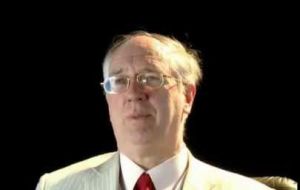MercoPress. South Atlantic News Agency
A new interaction emerging between US and the region, says panel of experts
 Kevin Casas-Zamora: business relationship and the 50 million Latinos and descendants living in the US
Kevin Casas-Zamora: business relationship and the 50 million Latinos and descendants living in the US  Laurence Whitehead: Latinamerica in the midst of a generational change with old elites nearly eclipsed
Laurence Whitehead: Latinamerica in the midst of a generational change with old elites nearly eclipsed  Obama has proposed a strategic line acting as “good partners,” and sharing responsibilities, said Restrepo
Obama has proposed a strategic line acting as “good partners,” and sharing responsibilities, said Restrepo The Organization of American States (OAS) hosted its 51st Policy Roundtable on the theme “Power Shifts in Latin America: Current Trends” at the headquarters of the organization in Washington, DC. Most experts coincided in a new interaction between the US and the region despite ideology still plays a role, but overall the old elites are being eclipse.
Hugo de Zela, Chief of Staff of the Secretary General of the OAS, José Miguel Insulza, opened the event, saying that “there are different aspects to discuss, such as the origins and consequences of the political changes we are experiencing in the region today, what are the possibilities, which changes are transitional, who are the new players, are they regional or are there extra-regional actors, and how it all combines to generate a complex and ever-changing set of diplomatic interactions and architecture.”
“We live in a hemisphere in which ideologies play an important role, we have seen in recent years several cases have been politically sensitive that have been dealt with in our organization where ideology has played a central role,” said Ambassador De Zela, and cited as an example the collective analysis of the implementation of the Inter-American Democratic Charter that took place in June 2011.
Kevin Casas-Zamora, Secretary for Political Affairs of the OAS, spoke about trends in relations between Latin America and the United States, highlighting the importance of non-governmental exchanges, for example in the private sector and those brought about by migration. In that context, Casas-Zamora said some analysts overemphasize the importance of official relations.
“There is another level, much more important, and often neglected, that does not pass through official channels but has to do with the relationship between the private sectors that generate 800 billion dollars a year,” said Casas-Zamora, referring to the large volume of trade relations between the United States and Latin America.
The Secretary for Political Affairs of the OAS said that “the fundamental vectors of this relationship go through the business relationship and all the phenomena generated by migration, and the brutally important fact of the 50 million Latinos and descendants of Latinos living in the United States.”
In this regard, he indicated that “at present there is a level of contact and overlap between North American society and Latin American societies far greater than at any previous time, and in some ways overrides whatever happens in the official channels.”
For his part, Laurence Whitehead, Fellow in Politics from the University of Oxford, said that the limitations of relations between the United States and Latin America have two factors, one internal and one external. The first is due to the weight of the United States Congress in Washington's strategic vision, while the external factor is due to the United States’ need to address other problematic regions, such as the Middle East, or issues such as the war on terrorism.
Professor Whitehead also said that Latin America is in the midst of a generational change, which he assessed as positive. “There are old elites who are stuck in previous postures who are nearly eclipsed.”
Dan Restrepo, former Senior Director for Western Hemisphere Affairs at the United States National Security Council, said the administration of President Barack Obama has proposed a strategic line with Latin America of acting as “good partners,” and sharing responsibilities.
“Mexico is one of the countries that have accepted the offer of partnership. The countries of the Alliance of the Pacific in large measures are countries that have accepted this offer of partnership,” Restrepo said, adding that there are other countries that rejected the offer out of hand, and there are what he called “undecided” countries, such as Brazil.
Arturo Sarukhan, former Ambassador of Mexico to the United States, said there is not just one Latin America as a geopolitical concept in the world, despite the cultural and linguistic unity of the region, noting that “there are subgroups in the region that are working and articulating interests and goals in very different ways.”
The former Ambassador of Mexico in the United States mentioned as an example of this the Pacific Alliance, which includes Mexico, Colombia, Peru and Chile, and said “it is the great geo-strategic hope for Latin America.”
“What this Alliance is doing is articulating a new vision based on a common canon of aspirations and interests, and giving structure to the way these nations relate with other international and regional actors, so as to give rise to a new paradigm,” he said.




Top Comments
Disclaimer & comment rules-

Read all commentsTWIMC
Jun 05th, 2013 - 07:46 am 0Article says...:
“Professor Whitehead also said:
Latin America is in the midst of a generational change, which he assessed as positive. “There are old elites who are stuck in previous postures who are nearly eclipsed.”
I say....:
Does ”Professor Whitehead” know what happens after an eclipse?
I guess he does...
We too...
Commenting for this story is now closed.
If you have a Facebook account, become a fan and comment on our Facebook Page!